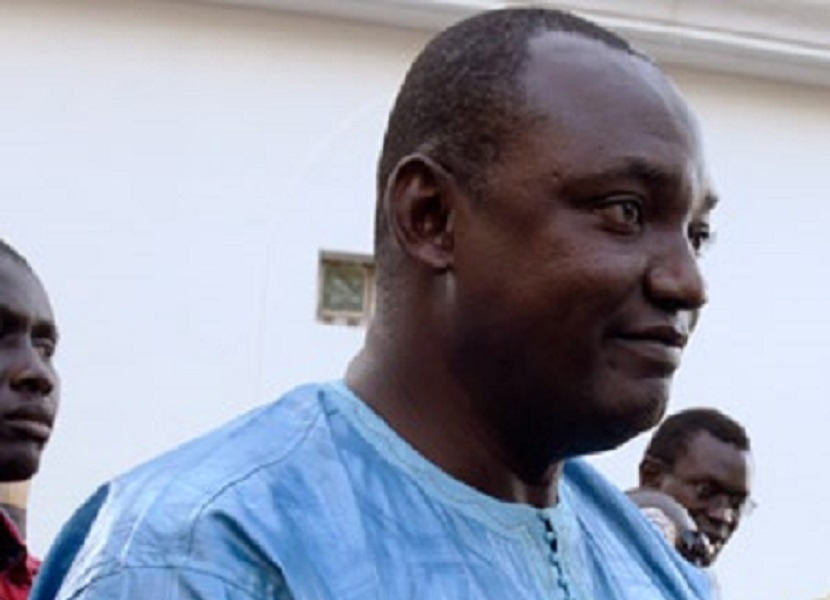Gambian President Adama Barrow’s team announced on Monday his vice-president would be a woman who has vowed to prosecute former leader Yahya Jammeh and take back assets she says were stolen from the nation.
The alleged plunder of some $11m by Jammeh as he clung on to power in recent weeks has left the tiny African country in financial difficulty, a Barrow aide said.
Barrow, who was sworn in as the new head of state on January 19 at his country’s embassy in neighbouring Senegal, has put off his return over fears for his safety.
As the nation waits, Barrow’s second-in-command was named as Fatoumata Jallow-Tambajang, who became a controversial figure after telling The Guardian newspaper Jammeh would be prosecuted for crimes committed by his regime.
Jammeh initially conceded defeat after the December 1 election, but the mercurial strongman announced he no longer recognised the result after Jallow-Tambajang’s comments, and after the election commission issued revised results which made Barrow’s win narrower, although still clear.
Luxury cars
The timing of her appointment comes after an aide to Barrow has accused Jammeh of raiding state coffers during his final days in power.
“Over two weeks, over 500 million dalasi ($11m) were withdrawn” by Jammeh, Mai Fatty said on Sunday in Dakar. “As we take over, the government of The Gambia is in financial distress.”
Jammeh also took luxury cars he piled onto a Chadian cargo plane, Fatty said.
A development expert who previously worked of the United Nations, Jallow-Tambajang is often described as the woman who persuaded The Gambia’s divided opposition parties to club together and field a single candidate — Barrow.
She has also argued that a national commission for asset recovery should be established to take back land and goods Jammeh is accused of seizing for his own gain.
Immunity debate
Under the threat of a regional military intervention, Jammeh chose exile in Equatorial Guinea, which is not party to the International Criminal Court, and left The Gambia on Saturday.
That means he cannot be extradited in the event he is charged with crimes against humanity or other serious offences.
A truth and reconciliation committee is Barrow’s “preferred method” of dealing with grievances against the regime, his spokesman has said, but many Gambians take the harder line of his new vice-president.
Sections of the security services were under Jammeh’s personal control and are responsible for extrajudicial killings, torture and arbitrary detention, rights groups say.
Barrow has assured Jammeh he will have all the rights legally ensured to an ex-president, which under Gambian law includes immunity from prosecution, barring a vote by two-thirds of the national assembly.
However, the new president is keen to break with the repression of the past and his spokesman announced Monday that the right to due process would now be respected.
“There shall be no detainee without trial under his administration,” spokesman Halifa Sallah said.
Critics have raised concerns over a statement issued by the United Nations, regional bloc ECOWAS and the African Union that seemed to offer Jammeh comfortable guarantees in return for his exit.
The statement said “no legislative measures” would be taken that against Jammeh or his family, noting that he could return when he pleased and that property “lawfully” belonging to him would not be seized.
Preparations for return
Meanwhile on the streets of Banjul, troops from five west African nations were securing the capital and its surrounds to ensure Barrow’s safe return.
The Senegalese general leading the operation, Francois Ndiaye, came to Banjul to meet Gambian top brass, a statement by his office said, and to “reassure” the country’s population.
Barrow hopes some of the 7,000 troops mobilised earlier this month by Senegal and four other nations would remain in place after his arrival.
“I know that everyone is anxious that he comes,” Barrow spokesman Sallah said, also on Monday. “Everybody recognises we do not need any vacuum.”
The Gambia’s army chief said Monday the regional troops were welcomed with open arms.
Chief of defence staff Ousman Badjie told AFP the Malian, Senegalese, Togolese, Nigerian and Ghanaian soldiers “are our brothers,” adding “we are happy that they are here to complement our efforts.”







